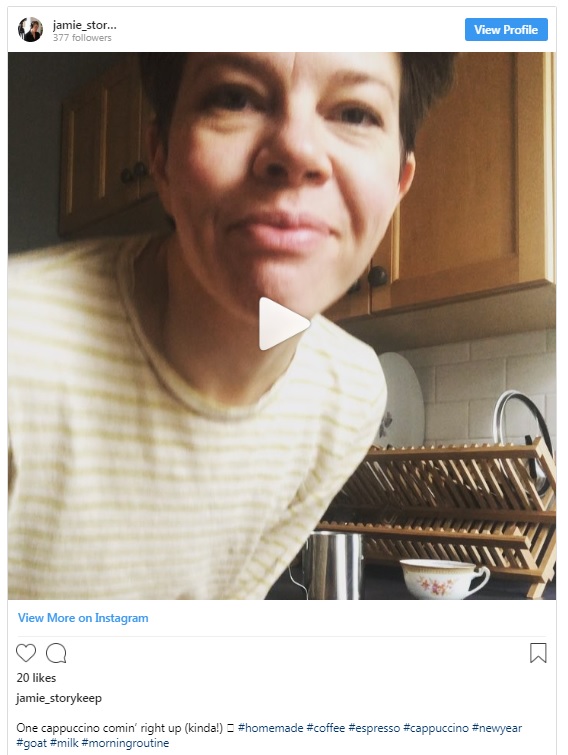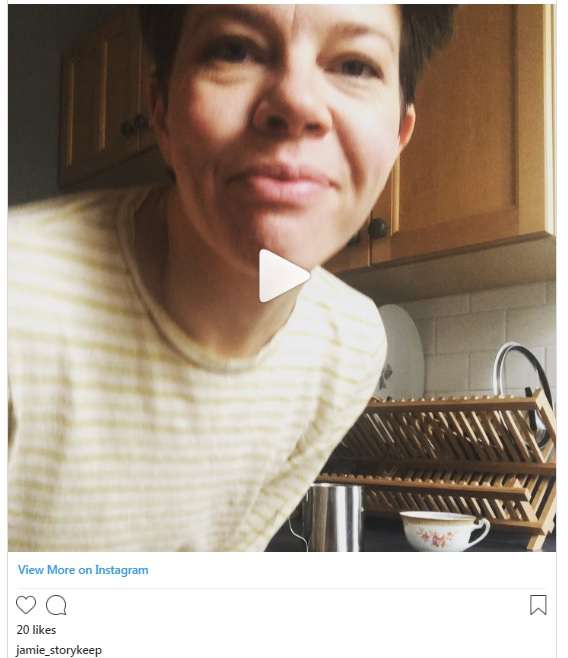What would you do if you were shooting a video demonstrating making a cappuccino, and you spilled your espresso?
If you’re my friend Jamie Yuenger, you’d post it, warts and all.
Don’t get me wrong. I love that feeling when I stick the landing.
^ This Mary Lou Retton video won’t play in the embed but you can click to play on YouTube.
But Jamie’s video is what life is really like most of the time. Not the perfectly made up and expertly filtered take, but a little messy. Or a lot messy.
There’s a danger when we compare our own messy real lives with our friends’ well-curated social media lives that we’ll think we’re the only ones who spill the espresso, metaphorically. The beauty and generosity in sharing the screw up is that vulnerability gives the rest of us reassurance that it’s not just us.
Done is better than perfect
There are a few phrases we use a lot in our home:
- Don’t let great get in the way of good
- Done is better than perfect
- No painting is ever finished, only abandoned
John is a painter, I’m a writer, and we can both overwork and overthink a project. An ex-boyfriend once yelled at me during a fight that I’m like water, that I will expand to take up as much (or as little) time as there is to do a task. Well, aren’t a lot of us like that? If you had a month to carefully craft a sensitive email, how many times would you re-read it?
You know what’s a great antidote to overthinking? Working as a reporter at a daily newspaper. At the first newspaper where I worked, I had to meet a quota of turning in two stories and two briefs every morning. A story meant something like 800 words, a brief was a few paragraphs.
Every morning, deadline was going to come and the press was going to run, shaking the entire building as it printed newspapers to drop on the front step of houses all over our region, and my editor wasn’t going to leave a big blank spot on the page while I finessed a sentence that wasn’t quite there yet. I just had to press send.
And it never killed me. My byline sat on top of a bunch of stories that weren’t my best work, and I survived having thousands of people see my name attached to mediocre reporting and lackluster writing.
Since I don’t have an editor for this blog, the same thing still happens. I’ll go back and read an old post and wince as I realize I didn’t explain something well or there’s a typo … and it didn’t kill me.
Perfectionism is not the same as pursuit of excellence
If you’re an A student, the lure of perfectionism is seductive. You want to do your best work and there is always always something more you could do.
Researcher, author and all-around inspiration Brene Brown studies vulnerability, worthiness and shame. She spoke to Oprah Winfrey about perfectionism:
“What emerged for me in the data is that perfectionism is not about striving for excellence or healthy striving,” Dr. Brown tells Oprah. “It’s … a way of thinking and feeling that says this: ‘If I look perfect, do it perfect, work perfect and live perfect, I can avoid or minimize shame, blame and judgment.’”
“This was my other aha [moment]!” Oprah says, giving Dr. Brown a high-five. “Perfectionism is the ultimate fear … People who are walking around as perfectionists … They are ultimately afraid that the world is going to see them for who they really are and they won’t measure up.”
“There’s no question,” Dr. Brown agrees. “I call perfectionism ‘the 20-ton shield.’ We carry it around thinking it’s going to protect us from being hurt. But it protects us from being seen.”
Choosing vulnerability instead of perfection
When I was an MBA student, I came in having studied journalism, with no education in business or statistics. Many of my classmates were engineers, some were consultants, so things they did every day sounded totally foreign to me. I had barely used Excel in my life.
Since I was paying a lot of money for my education, I made a decision that if I didn’t understand something, I would raise my hand. I would risk looking dumb to further my education.
At first, it was mortifying. Then an interesting thing happened: Classmates would approach me at break and tell me they were confused, too, but they assumed they were the only ones, so they didn’t want to slow down the people who already got it. They thanked me for being the one to ask.
A similar thing happened this weekend. I made a decision to raise a concern in a workshop. In this case, I knew others were thinking similar thoughts, but it still felt risky to challenge the instruction were given and to disagree.
But I had recently re-read this Brene Brown interview, so I channeled her:
Imagine walking into a meeting at work, Dr. Brown says. “You have to make the choice: Am I going to show up and let myself be seen?” she poses. “Am I going to raise my hand and say, ‘Wow, y’all look super excited. [But] I don’t know what in the hell you’re talking about. I’m so lost.’ That’s a choice.”
Coincidentally, I was working to develop my vulnerability in this workshop. The universe gave me the perfect opportunity to step into it.
Then an interesting thing happened, again: My classmates circled me in the bathroom and hugged me, sharing their agreement and support.
Because when you get real, you give other people permission to put down their 20-ton shield, too.
Related posts:
- Day 29: Life’s messy and that’s OK
- Showing vulnerability might actually be a good thing — or how a humiliating moment won’t kill you
- Crying at an improv workshop was a good thing
- Why I’m grateful our new Christmas tablecloth looks tiedyed
- Are you being polished by life?


